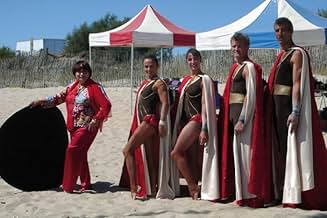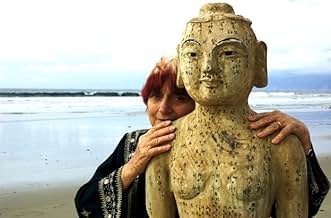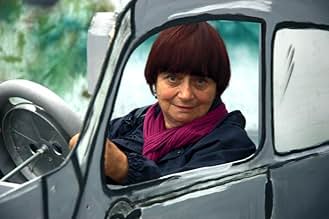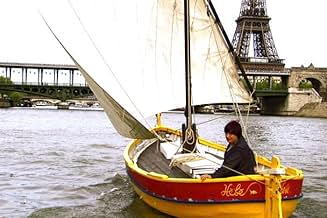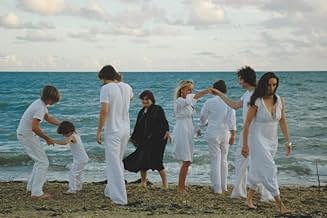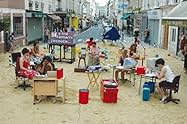IMDb रेटिंग
8.0/10
5.1 हज़ार
आपकी रेटिंग
अपनी भाषा में प्लॉट जोड़ेंAgnès Varda explores her memories, mostly chronologically, with photographs, film clips, interviews, reenactments, and droll, playful contemporary scenes of her narrating her story.Agnès Varda explores her memories, mostly chronologically, with photographs, film clips, interviews, reenactments, and droll, playful contemporary scenes of her narrating her story.Agnès Varda explores her memories, mostly chronologically, with photographs, film clips, interviews, reenactments, and droll, playful contemporary scenes of her narrating her story.
- पुरस्कार
- 12 जीत और कुल 13 नामांकन
Gerald Ayres
- Self
- (as Gerry Ayres)
Patricia Louisianna Knop
- Self
- (as Patricia Knop)
फ़ीचर्ड समीक्षाएं
So I finally arrive for the last leg of my journey with Varda in this self portrait. I will rest here for the time being with the beautiful introspection of it; not because she has stopped working, she hasn't, but this permits an appreciation of everything she strives to live for. For newcomers it will be a good place to start knowing her and they can deepen each chapter by going back to her earlier travels.
Introspection isn't the word actually. Varda doesn't keep things internalized, I don't get the sense of anything hidden or dimly seen. For her it is all readily available, it is all externalized and offered up to us like we are guests in her house on an afternoon and she just waves us in smiling. I get the sense of a woman who has traveled far and seen amazing things and can't wait to share it all with a giddy, sometimes shy, excitement.
This isn't the first time she is reflecting on her life of course, many of her works are self portraits on the side or inspired by real life. We learn for example that Daguerrotypes she filmed around her neighborhood because she was pregnant at the time and had to stay at home. But how does she present herself here, on this stage of her life? What images of her? Varda as grandmotherly raconteur, as young girl overcoming her shyness with men, as spirited woman who protested injustice, as wife and soulmate and explorer.
As for stories, she has been all over and has plenty to share. Traveled to China and Cuba in her twenties and came back with images of revolution. Knew Godard and speaks about her filmmaking start via Resnais. She was in Oakland in '68 to film the Panthers. Knew Jim Morrison and was with him in his last days. Lived around Warhol's circle in LA. Protested feminism with Delphine Seyrig in the streets. Marker is in the film, speaking from behind an image. These and more.
But saying that she shares it all out in the open isn't the whole truth either; truth is knowing how to sculpt it after all. You might appreciate how eloquently she speaks about discovering sex in Corsica one summer by not speaking about it. How gracefully she speaks about her marriage, sketching merely the air around unhappiness (as all marriages know); she was the woman in Documenteur. She is one of those beautiful souls who know how to move towards things, how to move back, how to see and from what distance.
The most lasting impression this leaves me with however is of a woman who glides through lives she recalls and summons to her in the beach of memory, and this is Varda herself in the actual film moving through images, photos of childhood, mirrors, a visit to her childhood home yields an impromptu discussion about model trains, clips from old films, enactments, narrations about these. But moves with an unfettered soul. She opens the film with "I'm playing the role of a little old lady, telling her life story". How to be like Varda? Explore the role of someone who happens to be the person you are growing into, be open to the encounter; no more is necessary.
For near the end she reserves a small gem that carries the wisdom of entire lives, there's more to this one line than there is in entire careers. Prior to it, we have seen a woman who has known heartbreak enough, pacing alone in the house of images (the place with strips of film hanging from walls). Now her family, kids and grandkids, are dancing nearby. Watching them she muses that they are her happiness, she doesn't know if she knows them or understands them, she just goes towards them.
Something to meditate upon.
Introspection isn't the word actually. Varda doesn't keep things internalized, I don't get the sense of anything hidden or dimly seen. For her it is all readily available, it is all externalized and offered up to us like we are guests in her house on an afternoon and she just waves us in smiling. I get the sense of a woman who has traveled far and seen amazing things and can't wait to share it all with a giddy, sometimes shy, excitement.
This isn't the first time she is reflecting on her life of course, many of her works are self portraits on the side or inspired by real life. We learn for example that Daguerrotypes she filmed around her neighborhood because she was pregnant at the time and had to stay at home. But how does she present herself here, on this stage of her life? What images of her? Varda as grandmotherly raconteur, as young girl overcoming her shyness with men, as spirited woman who protested injustice, as wife and soulmate and explorer.
As for stories, she has been all over and has plenty to share. Traveled to China and Cuba in her twenties and came back with images of revolution. Knew Godard and speaks about her filmmaking start via Resnais. She was in Oakland in '68 to film the Panthers. Knew Jim Morrison and was with him in his last days. Lived around Warhol's circle in LA. Protested feminism with Delphine Seyrig in the streets. Marker is in the film, speaking from behind an image. These and more.
But saying that she shares it all out in the open isn't the whole truth either; truth is knowing how to sculpt it after all. You might appreciate how eloquently she speaks about discovering sex in Corsica one summer by not speaking about it. How gracefully she speaks about her marriage, sketching merely the air around unhappiness (as all marriages know); she was the woman in Documenteur. She is one of those beautiful souls who know how to move towards things, how to move back, how to see and from what distance.
The most lasting impression this leaves me with however is of a woman who glides through lives she recalls and summons to her in the beach of memory, and this is Varda herself in the actual film moving through images, photos of childhood, mirrors, a visit to her childhood home yields an impromptu discussion about model trains, clips from old films, enactments, narrations about these. But moves with an unfettered soul. She opens the film with "I'm playing the role of a little old lady, telling her life story". How to be like Varda? Explore the role of someone who happens to be the person you are growing into, be open to the encounter; no more is necessary.
For near the end she reserves a small gem that carries the wisdom of entire lives, there's more to this one line than there is in entire careers. Prior to it, we have seen a woman who has known heartbreak enough, pacing alone in the house of images (the place with strips of film hanging from walls). Now her family, kids and grandkids, are dancing nearby. Watching them she muses that they are her happiness, she doesn't know if she knows them or understands them, she just goes towards them.
Something to meditate upon.
Agnès Varda presented us in this autobiographical movie with her memories of a life devoted to the cinema and not only. She does that in powerful and beautiful images supported by a brilliant, witty and sensitive commentary. In this movie we can see references to several of some of the best Varda's films such as La Pointe Courte, Cléo de 5 à 7 and Le Bonheur, with images, and to some of the greatest and more important figures of French cinema such as her husband Jacques Demy to begin with and also Godard, Catherine Deneuve, Michel Piccoli, Jane Birkin and others. The cut is very intelligent and effective in visual terms combining the present and the past sometimes in simultaneous images with a special effect here and there. A masterpiece indeed.
I was fortunate to catch (October 30, 2009 in SF) "The Beaches of Agnès" aka "Les Plages d'Agnès" 2008, in French with English subtitles. Agnès Varda is 80 (in 2008) and still so lively, creative, imaginative, giving us delightful reminiscing of The New Wave film period, including the young and the old. What a filmmaker, cinematic lover, unique lady, she is. Besides being a retrospective look at Varda's cinematic life (so far), the film also serves as a loving dedication to the close to 30 years she shared with her husband Jacques Demy - the fabulous w-d-filmmaker who gave us the popular French films entirely sung musically: "The Young Girls of Rochefort" 1967 and "The Umbrellas of Cherbourg" 1964 (Catherine Deneuve was in both of these two gems).
If you like movies, film history, graphic design, visual play on imagery (or affiliated to none of the above), you will (still) feel akin to Varda's 'Beaches' whether you thoroughly understands French, speaks the language, been to Paris-France, or not. She has delivered a cinematic journey of going through the various phases of her life, experiences in film-making, and added her unique stamp of Agnès Varda sensibility. It's a good place to be and 'tis fun to hang around with her. As my favorite Emily Dickinson epigram says: Delight has no Competitor, so it is always most. Yes, Agnès Varda is alive and well and still full of humor, bemused or otherwise - a fantastic spirited woman, ever the innovative-discovery eye afresh, so full of wisdom, be it wistful or witty.
This film is a great companion piece for viewing with her loving remembrance of Demy: Jacquot De Nantes (1991), which is in Black & White, and Color, documented the hometown childhood origin which grew into the lifelong cinematic passion of Jacques. Another enjoyable Varda-Demy film, anytime.
There is an accessible official site USA at "cinemaguild.com/beachesofagnes" and the trailer at "cinemaguild.com/beachesofagnes/trailer.html". Looks like DVD is available, released on March 2, 2010.
If you like movies, film history, graphic design, visual play on imagery (or affiliated to none of the above), you will (still) feel akin to Varda's 'Beaches' whether you thoroughly understands French, speaks the language, been to Paris-France, or not. She has delivered a cinematic journey of going through the various phases of her life, experiences in film-making, and added her unique stamp of Agnès Varda sensibility. It's a good place to be and 'tis fun to hang around with her. As my favorite Emily Dickinson epigram says: Delight has no Competitor, so it is always most. Yes, Agnès Varda is alive and well and still full of humor, bemused or otherwise - a fantastic spirited woman, ever the innovative-discovery eye afresh, so full of wisdom, be it wistful or witty.
This film is a great companion piece for viewing with her loving remembrance of Demy: Jacquot De Nantes (1991), which is in Black & White, and Color, documented the hometown childhood origin which grew into the lifelong cinematic passion of Jacques. Another enjoyable Varda-Demy film, anytime.
There is an accessible official site USA at "cinemaguild.com/beachesofagnes" and the trailer at "cinemaguild.com/beachesofagnes/trailer.html". Looks like DVD is available, released on March 2, 2010.
It's not too often a filmmaker will give us a full and unambiguous autobiography on film; if we find out about who they are, he or she will bring themselves into the art that is ostensibly other stories. Agnes Varda looks back on her life using cinema and it is among the most unique things I've ever seen - though it is not inconsistent with many films she has made before (The Gleaners and I comes to mind) as far as her life being inextricably and most often joyfully being connected with her work. This doesn't mean she doesn't shy away from the pain as well; the parts regarding Jacques Demy in his final years are somber and tender.
Pure, unadulterated imagination, heart, empathy, a light yet wholly potent surrealism, a seemingly endless connection to other people, art, photography, and of course those cats (including an eccentric cameo by Chris Marker). I feel like I got a lifetime in just a little under two hours. And how about her cardboard car that she tries to park into her tiny garage!
And it's the kind of wonderful and priceless piece of autobiography that has digressions (one of which about Jim Morrison). It may help to see at least a few of her films before going into this, but even if you only have a cursory knowledge of film history or Demy or what have you, it's still effective and affecting as a story that contains many stories and is about getting us to see the world as vibrantly and daringly as she does.
As life changes and the world goes through other developments, the beaches stay the same.
Pure, unadulterated imagination, heart, empathy, a light yet wholly potent surrealism, a seemingly endless connection to other people, art, photography, and of course those cats (including an eccentric cameo by Chris Marker). I feel like I got a lifetime in just a little under two hours. And how about her cardboard car that she tries to park into her tiny garage!
And it's the kind of wonderful and priceless piece of autobiography that has digressions (one of which about Jim Morrison). It may help to see at least a few of her films before going into this, but even if you only have a cursory knowledge of film history or Demy or what have you, it's still effective and affecting as a story that contains many stories and is about getting us to see the world as vibrantly and daringly as she does.
As life changes and the world goes through other developments, the beaches stay the same.
Autobiographies can be the worst or the best of things. Either a boring exercise in conceit and self-absorption or a fascinating self-exploration by a person of value.
Well, the Agnes of 'Les plages d'Agnès' being Agnès Varda there is no need to worry. She undoubtedly belongs to the second category.
It goes without saying that to fully appreciate this wonderful film you have to be a minimum acquainted with Varda's oeuvre. But a minimum is enough, for it does not take long before the lady starts captivating you, not by boasting about all the masterpieces she made, but by creating a new kind of story-telling right before your eyes.
One thing I am pretty sure of is that there is no other film, autobiographical or not, that looks like "Les plages d'Agnès".
Of course there is no question that Varda's life is rich and worth telling: she worked for and with great artists, she was married to one of the most original French directors ever (Jacques Demy), she covered the fledgling Chinese and Cuban revolutions, fought in favor of feminism when it was not yet fashionable to do so. The real issue for the director was in fact to find HOW to talk about herself. Well after viewing "Les Plages d'Agnès", I can tell her (and I am far from being the only one to think so): "You did it brilliantly, Agnès".
Indeed Agnès Varda is not content to go through the motions of the standard autobiographical movie: talking face to the camera or in voice over, interviewing witnesses of her life and illustrating her words with significant clips. She does that of course but she knows how to enrich the material through a lot original finds: the mirrors on the beaches,her walking backwards to show she goes back in time, the circus artists on the beach, recreating her Cine Tamaris production office on a fake beach in Rue Daguerre, her sailing a boat from Sete to Paris as an allegory of the evolution of her career, etc. etc. Agnès Varda never rests on her laurels throughout. Quite the contrary: she creates, invents, tries out new things sequence after sequence. In the film she calls herself 'une petite vieille' (a short old lady) but I suspect she says so out of vanity because she does not look old at all. Actually, she has retained all the freshness, all the spontaneity of the young lady she once was.
Don't refrain from seeing this film even if it does not appeal to you in the first place. When the end credits roll you will probably - just like I did - utter with a sigh: "Is it already the end?"
Well, the Agnes of 'Les plages d'Agnès' being Agnès Varda there is no need to worry. She undoubtedly belongs to the second category.
It goes without saying that to fully appreciate this wonderful film you have to be a minimum acquainted with Varda's oeuvre. But a minimum is enough, for it does not take long before the lady starts captivating you, not by boasting about all the masterpieces she made, but by creating a new kind of story-telling right before your eyes.
One thing I am pretty sure of is that there is no other film, autobiographical or not, that looks like "Les plages d'Agnès".
Of course there is no question that Varda's life is rich and worth telling: she worked for and with great artists, she was married to one of the most original French directors ever (Jacques Demy), she covered the fledgling Chinese and Cuban revolutions, fought in favor of feminism when it was not yet fashionable to do so. The real issue for the director was in fact to find HOW to talk about herself. Well after viewing "Les Plages d'Agnès", I can tell her (and I am far from being the only one to think so): "You did it brilliantly, Agnès".
Indeed Agnès Varda is not content to go through the motions of the standard autobiographical movie: talking face to the camera or in voice over, interviewing witnesses of her life and illustrating her words with significant clips. She does that of course but she knows how to enrich the material through a lot original finds: the mirrors on the beaches,her walking backwards to show she goes back in time, the circus artists on the beach, recreating her Cine Tamaris production office on a fake beach in Rue Daguerre, her sailing a boat from Sete to Paris as an allegory of the evolution of her career, etc. etc. Agnès Varda never rests on her laurels throughout. Quite the contrary: she creates, invents, tries out new things sequence after sequence. In the film she calls herself 'une petite vieille' (a short old lady) but I suspect she says so out of vanity because she does not look old at all. Actually, she has retained all the freshness, all the spontaneity of the young lady she once was.
Don't refrain from seeing this film even if it does not appeal to you in the first place. When the end credits roll you will probably - just like I did - utter with a sigh: "Is it already the end?"
क्या आपको पता है
- ट्रिवियाFrench visa # 118156.
- कनेक्शनEdited into Film socialisme (2010)
टॉप पसंद
रेटिंग देने के लिए साइन-इन करें और वैयक्तिकृत सुझावों के लिए वॉचलिस्ट करें
- How long is The Beaches of Agnès?Alexa द्वारा संचालित
विवरण
- रिलीज़ की तारीख़
- कंट्री ऑफ़ ओरिजिन
- आधिकारिक साइटें
- भाषाएं
- इस रूप में भी जाना जाता है
- The Beaches of Agnès
- फ़िल्माने की जगहें
- उत्पादन कंपनियां
- IMDbPro पर और कंपनी क्रेडिट देखें
बॉक्स ऑफ़िस
- बजट
- €19,00,000(अनुमानित)
- US और कनाडा में सकल
- $2,39,711
- US और कनाडा में पहले सप्ताह में कुल कमाई
- $19,032
- 5 जुल॰ 2009
- दुनिया भर में सकल
- $22,35,006
- चलने की अवधि1 घंटा 52 मिनट
- रंग
- पक्ष अनुपात
- 1.85 : 1
इस पेज में योगदान दें
किसी बदलाव का सुझाव दें या अनुपलब्ध कॉन्टेंट जोड़ें


![Bande-annonce [OV] देखें](https://m.media-amazon.com/images/M/MV5BZGYxNzE1MDgtYjIzMy00NmY0LTkyMmItMTFkZjVlNmMyNTVmXkEyXkFqcGdeQXRyYW5zY29kZS13b3JrZmxvdw@@._V1_QL75_UX500_CR0)



